National Cervical Screening Programme Sector Update - July 2023
Te Whatu Ora has announced $7.3 million in funding to provide free cervical screening services for priority groups as part of its move to the new HPV test. Both the availability of the funding and the launch of the new test will now take place on 12 September, replacing the previous date of 26 July.
Free Cervical Screening for Priority Groups
To clarify, free screening will be available from 12 September for:
- women and people with a cervix 30 years and over who are unscreened (have never had a screening test) or under-screened (haven’t had a cytology test in the past 5 years)
- anyone requiring follow up
- Māori and Pacific
- anyone who is a community service card holder.
As this is a recent announcement we are working through the implementation detail and will provide an update as this progresses.
Providing free HPV cervical screening tests will play a critical role in helping more people to access the programme. The new HPV cervical screening test will be much easier to use and will identify more pre-cancers, preventing more cases of cervical cancer.
The new HPV test means that people will have three options for having a cervical screening test:
- you can choose to collect your own sample, via a simple self-test vaginal swab.
- you can ask your healthcare provider to collect your vaginal swab sample, or
- you can choose to have your healthcare provider take a sample from your cervix; what used to be called a smear test. (If HPV is found, this option also allows for your sample to then be checked for any cell changes)
The new launch date of 12 September will enable the health system time to prepare to offer the free screening for those who are eligible, as well as further test the new information technology systems that will support the screening programme.
The new IT systems will make it easier for us to reach out to those who don’t regularly access screening to invite them to take part, offer support to access appointments, such as help with transport, as well as answer any queries they might have. It will also make it easier for people to know when they are due for their next test. The robust testing that we are undertaking on the newly-built NCSP-Register will help to ensure all components are working and that data is safe, accurate and up-to-date.
The delay in the launch date will not affect the overall delivery timeframe for the new HPV screening programme, which will be completed by the end of March 2024.
We urge those due or overdue for screening to get screened now. The current cervical screening test (often called a smear test) is safe and effective in protecting against cervical cancer.
Apology to National Kaitiaki Group
A significant hui was recently held to apologise to the National Kaitiaki Group (NKG), a key body within the National Cervical Screening Programme (NCSP) who ensure the protection of wāhine Māori/women’s cervical screening data.
In the past, the NCSP focus to provide wider data accessibility and transparency did not fully consider or understand data sovereignty or acknowledge the sanctity of te whare tangata/the house of humanity, womb, uterus, temple.
That lack of understanding led to actions that did not respect the knowledge, expertise, or mana of the National Kaitiaki Group. This caused harm to our relationship and, understandably, a breakdown in trust in the NCSP’s commitment to Māori data sovereignty.
We are committed to respecting the taonga that is wāhine Māori data, and committed to working in partnership with the National Kaitiaki Group to ensure this data is honoured and used for the benefit of wāhine Māori, and we will continue to work to heal this relationship.
Clinical Practice Guidelines
The National Cervical Screening Programme (NCSP) Clinical Practice Guidelines 2023 for Cervical Screening in Aotearoa New Zealand are available, and are for use when HPV testing becomes the primary screen for cervical cancer prevention. The Guidelines can be found on the NSU Health Professionals’ website at https://www.nsu.govt.nz/health-professionals/national-cervical-screening...
NCSP Policies and Standards
Work is progressing on updating the NCSP Policies and Standards and to prepare them for publication. We expect that Sections 1, 2 and 5 should be available by 28 July and Sections 3 and 6 by 7 August. (Note: There is now no Section 4). The Sections are named:
- NCSP Policies & Standards Section 1 - Tiro Whānui Overview
- NCSP Policies & Standards Section 2 - Providing Register Services
- NCSP Policies & Standards Section 3 - Cervical Screening Services
- NCSP Policies & Standards Section 5 - Providing a Laboratory Service
- NCSP Policies & Standards Section 6 - Providing a Colposcopy Service
Training
Training for HPV primary screening is ramping up. A clinical eLearning course is available on LearnOnline. You can access it at Cervical Screening Using Human Papillomavirus (HPV) Testing.
If you don’t have an account with LearnOnline, you can create one here and you’ll then be able to access the course.
The first clinical eLearning module, Introduction to Cervical Screening Using Human Papillomavirus (HPV) Testing, is available now. This 60-minute module provides you with an overview of cervical screening in Aotearoa New Zealand, introduces the new Clinical Practice Guidelines for cervical screening, and will help you understand HPV and its role in the development of cervical cancer; HPV vaccination; and HPV testing and pathways.
Module 2, Navigating the Cervical Screening pathways - practising using the pathways with various cases, is also now live on LearnOnline. This 30-minute module presents a series of examples of how to interpret the cervical screening pathways in the Clinical Practice Guidelines for Cervical Screening in Aotearoa New Zealand. It then presents a further 13 scenarios, to give you a chance to check your understanding and apply the guidelines to each situation.
This module is the second in a series of four modules. Modules 3 and 4 are expected by 28 July. All four modules must be completed to receive a Certificate of Completion.
If you have any questions about the modules or other training, please email us at [email protected]
Change Packs for the Sector
The programme has sent out an information pack, Pack 1 September Go-Live UPDATE, about the transition to HPV primary screening which now goes live on 12 September. This is one of four that will be sent between now and the end of September.
This pack contains the following information:
- Background
- Updated timeline
- Overview of information packs
- Training and resources
- Follow up and support
If you didn’t receive this information please email us at [email protected]
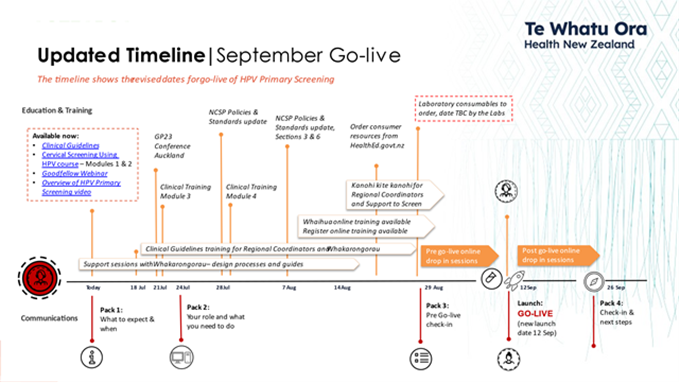
NSU Website Updated
The HPV primary screening pages on the Health Professionals section of the National Screening Unit website have been updated and made more user-friendly. From the HPV primary screening landing page, you can click onto pages which give a background to the transition to HPV testing as the primary screen for cervical cancer prevention; role-specific information; resources and guidelines; overview of the new NCSP-Register; links to legislation and to the NCSP Advisory and Action Rōpū.
Training resources are under development and links will be published once ready.
The landing page can be found at: https://www.nsu.govt.nz/health-professionals/national-cervical-screening...
Engagement with the Sector
We are scheduling engagement activities to support the change communications (packs). The current focus for July includes
- Presentation to GP NZ Primary Care Clinical Leads on 13 July
- Presentations at the Australian Society of Colposcopy and Cervical Pathology in Queenstown from 19-21 July
- Presentation and stand at the conference for General Practice 2023 in Auckland from 21-23 July
- Presentation to GP NZ Nurse Leaders on 27 July
Goodfellow Webinar Success
A webinar hosted by the Goodfellow Unit, and focused on the transition to HPV primary screening, was a huge success in early June. A total of 2200 registrations were received and the webinar received an approval rating of just under 100%.
We have provided answers to questions raised at the webinar, which were not answered on the night. These on the NSU health professionals’ web pages at Goodfellow Unit Webinars | National Screening Unit (nsu.govt.nz)
A link to the webinar itself can be found at https://www.goodfellowunit.org/events-and-webinars/hpv-primary-screening...
A big mihi to the Metro Auckland Cervical Screening Operations Group (MACSOP) for their work in arranging the webinar.
HPV primary screening – Lab talks
Dr Margaret Sage (NCSP Clinical lead, Pathology and NCPTS Cytopathologist) has provided information videos for HPV primary screening, written to train lab staff.
These are free to access and available on the National Cervical Pathology Training Service site. Click on HPV primary screening training in the top left-hand corner of the homepage. No login needed (see top left of the page): https://ncpts.co.nz/
After each talk, there is a set of 10 Multiple Choice Question clinical scenarios to practise applying the guidelines. Anyone is free to answer the questions – you need to enter your name as instructed at the beginning if you are answering the questions. (This is just so we know you aren’t a laboratory staff person because the labs staff are getting a certificate and CPD points if they complete the training).
No one will be looking at the answers for anyone outside the laboratory sector workforce. You can use a dummy name if you want to, but we would really encourage people to work through the questions as it really makes you think about the guidelines.
New HPV Primary Screening Public-Facing Resources
Good progress is being made on the development of the initial Foundation Resources, to be made available on HealthEd.govt.nz from mid-August. You will need to place your order via HealthEd to receive the quantity of the specific resources your community’s needs in time for 12 September.
Foundation resources will include the following:
Updated resources
- Cervical Screening: What you need to know pamphlet (current HE1256) - generic English and te Reo Māori versions
- Cervical Screening: Understanding test results pamphlet (current HE4598) - generic English and te Reo Māori versions
- Colposcopy: What you need to know pamphlet (current HE1202) - generic English and te Reo Māori versions
New resources
- Cervical Screening: Your test, your choice (pamphlet) – generic English and te Reo Māori versions, plus a version in English tailored to Pacific audiences
- The Cervical Screening Self-test: What you need to know (leaflet) - generic English and te Reo Māori versions, plus a version in English tailored to Pacific audiences
- Cervical Screening: How to do the HPV self-test (A4 poster) - generic English and te Reo Māori versions
- Cervical Screening: How to do the HPV self-test (A3 poster) - generic English and te Reo Māori versions
- Ask about the new cervical screening test (A4 poster) - generic English and te Reo Māori versions, plus a version in English tailored to Pacific audiences
Paid advertising to support the transition by raising awareness of the changes will start from the go-live date. The campaign will have a soft launch, beginning with targeted online activities, and will build over time to include radio, print and outdoor media. A partner pack of messages and social content will be made available via a Partner toolkit on the nsu.govt.nz website by late August.
Mahi Around the Motu
Some awesome mahi is being done around the motu to promote cervical screening. In the Te Tai Tokerau / Northern Region, a cervical screening clinic was held in conjunction with NorthTec in June to support them.
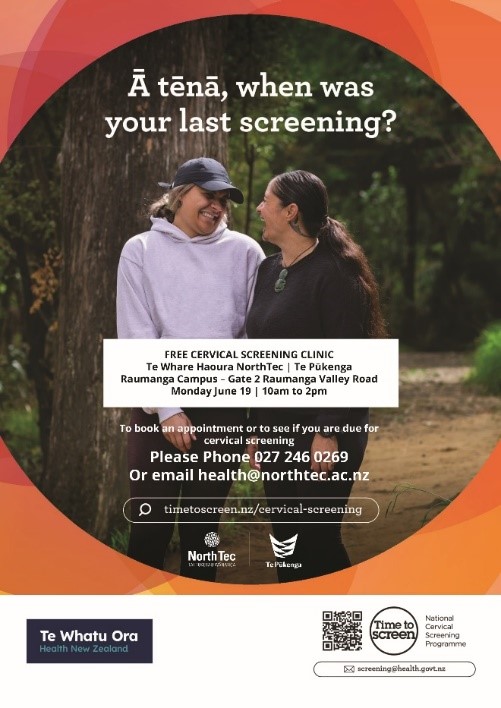
The team there is also running regular Te Whatu Ora Outreach clinics on a Tuesday in Whangarei and some in South Whangarei on Thursdays (Mangawhai, Kaiwaka area) for priority wāhine.
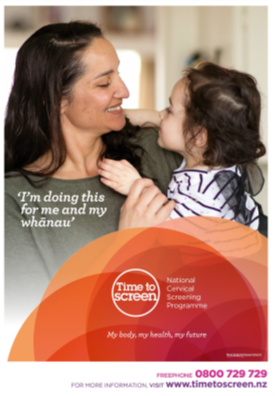
They are also working with Te Ha Oranga community provider (Wellsford) and Broadway Medical Centre (mid and far North clinics) to run some cervical screening clinics for their overdue wahine.
Examples of the posters used to promote the clinics are shown above.
A First For Tairāwhiti …
There was a buzz of gratitude around the room as Tūranganui-a-kiwa held its first Cervical Sample Taker Training Course at the Tangata Rite Building on Peel Street in Gisborne.
Bringing this training to the community was the result of collaboration between Pinnacle Midlands Health Network, Well Women and Family Trust (Auckland) and Te Whatu Ora – Tairāwhiti.
Organisers from the Well Women and Family Trust were thrilled when they were sought out to provide training in Gisborne.
Connection was a main focus at the workshop, with facilitators hoping that local doctors and nurses from different practices would be able to get to know each other.
“Allowing the participants to network, the hope is to make sure everyone is aware of the support they have within their community,” says Tracy Fergus, Clinical Services Manager at Pinnacle Midlands Health Network.
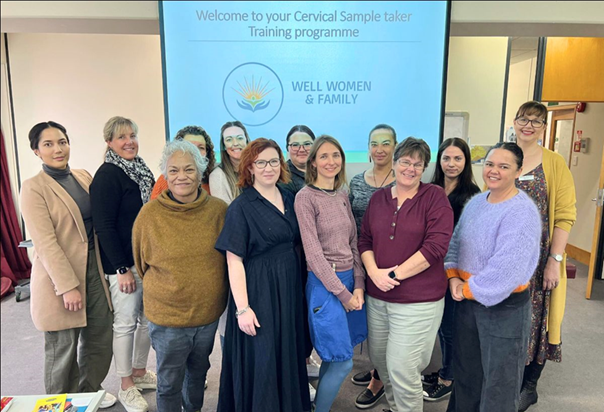
Previously, training was only offered outside the region, creating barriers for many of local health providers as it would require a night away from work and their families. Many of the workshop participants spoke about how the local training made it more accessible for them to attend as they were single mothers.
Dr Anja Neugebauer, from The Doctors Te Whare Hapara, spoke about how grateful she was that the training could be offered locally as she would not have been able to leave her children to do a two-day training course in Auckland.
In total, 13 health professionals were trained. Evelyn Cross, regional coordinator for the National Cervical Screening Programme, hopes to make this an annual training opportunity -- “Increasing the numbers of sample takers in the region aligns with the National Cervical Screening Programme vision of reaching more participants in their own communities and expanding the workforce with more Māori and Pacific staff at all levels of the screening process” she says.
Remembering Talei
Also remembering a phenomenal wahine, Talei Roimata Morrison (4 November 1975 – 16 June 2018) who passed from cervical cancer in June 2018, 10 months after diagnosis in August 2017.
We remember her and her call for wāhine to have their cervical screens so no-one else suffers as she did and no whānau loses another loved one.
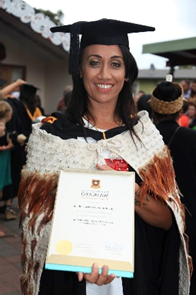
Links to Further Information
Links to other important information are listed below:
Educational Video
The educational video -- Overview of HPV Primary Screening – can be found on the NSU Health Professionals Education and Training Page Introduction to HPV primary screening | National Screening Unit (nsu.govt.nz)
It is aimed at giving health sector professionals a high-level background on the benefits of transition to HPV primary screening for the prevention of cervical cancer.
Resources Page
We continue to update our Resources page on the NSU website. The page can be found at https://www.nsu.govt.nz/health-professionals/national-cervical-screening...
Parliamentary Review Committee
The 2021 Parliamentary Review Committee (PRC) report into the NCSP has been tabled in the House of Representatives and is published on the NSU website here. Alongside the report is a summary document outlining Te Whatu Ora’s response and next steps. The NCSP is commencing engagements on the action plan.
Immunisation Update
For any school-based Immunisation Programme collateral like consent forms for use by health professionals please visit the HealthEd website here.
NCSP Advisory and Action Rōpū
The rōpū met on Thursday 22 June (in person hui). Minutes of previous meetings can be found here.
Support to Screening Services web page
The web page for our SSS teams supporting the work of both the National Cervical Screening Programme (NCSP) and BreastScreen Aotearoa (BSA) has been updated to include a new provider in the Hutt Valley. The page is available here.
Screening support services are available for eligible wāhine/whānau who are referred to, or who independently access services from the support to screening providers. This support can assist wāhine/whānau who experience barriers to accessing breast and cervical screening, assessment, and treatment services. Some support to screening providers have mobile teams who make community visits and home visits, while others are based in clinics around the motu.
Coverage app
The NCSP coverage app has recently been updated and is now available at https://tewhatuora.shinyapps.io/nsu-ncsp-coverage/
More information …
…is available on the website here: Frequently asked questions | National Screening Unit (nsu.govt.nz). If you have colleagues who would also like to receive this monthly update, they can join the distribution list by emailing us at [email protected] .

